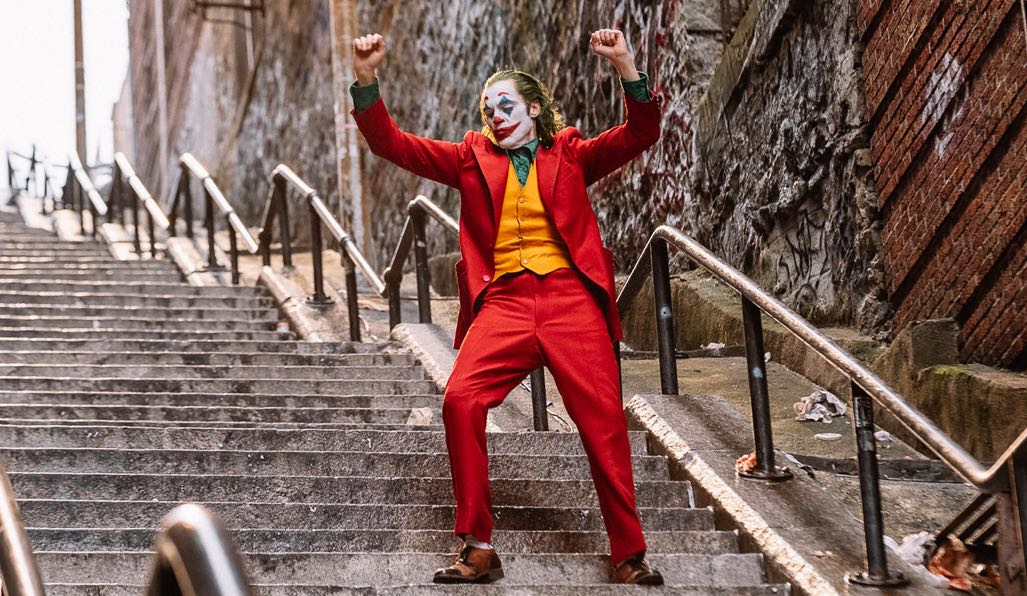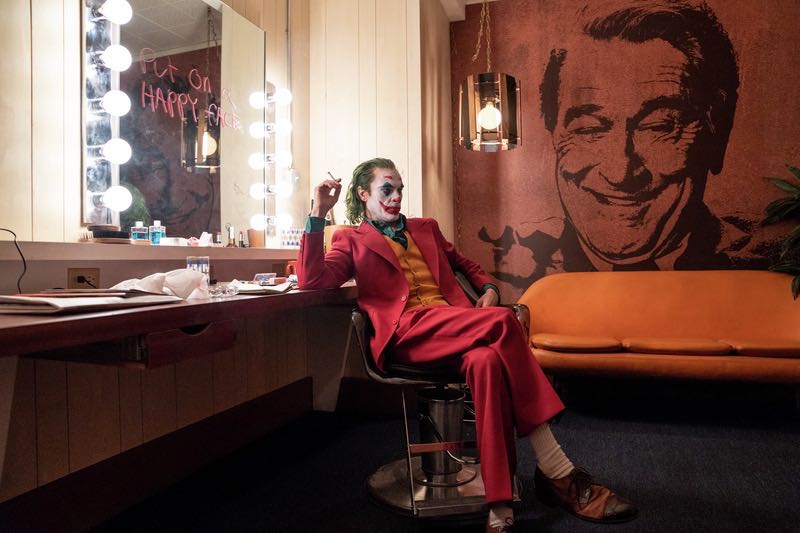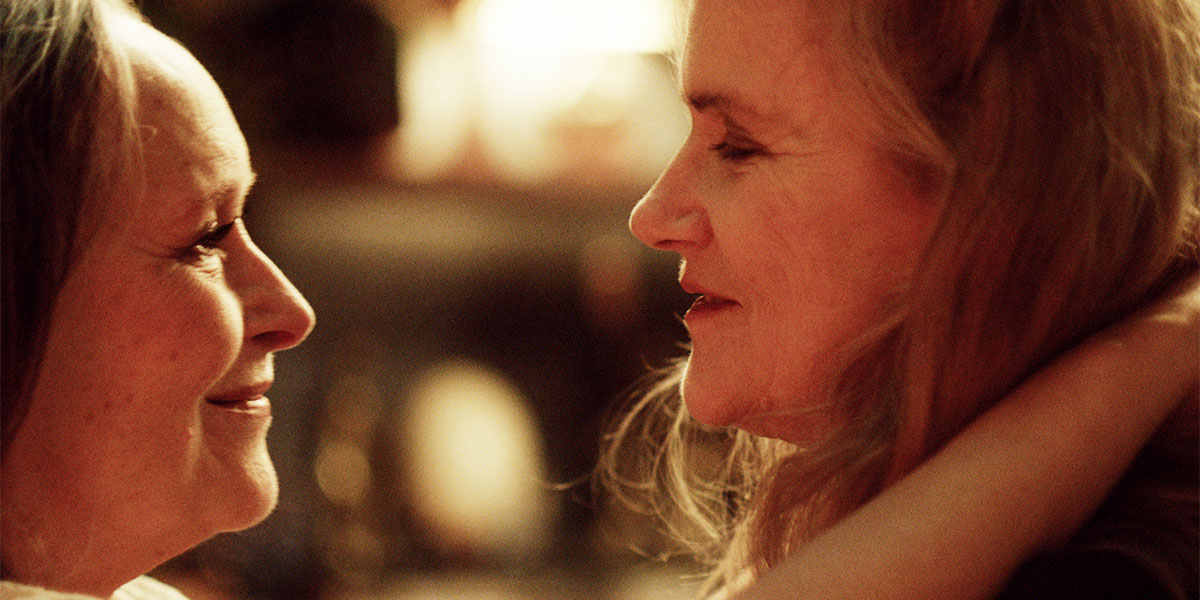Enjoying its North American premiere at the 2019 Toronto International Film Festival, Joker arrived as a hotly anticipated feature after winning the Golden Lion in Venice.
Critics started lining up for the Joker film’s Press & Industry screening at TIFF 2019 two hours in advance. It was one of the most buzzed about films at the festival. Both its press and public premieres enjoyed standing ovations and rave reviews.
Joker features a career defining performance by Academy Award winning actor Joaquin Phoenix. His haunting portrayal in Joker offers DC Comic fans a fresh take on the superhero film genre.
The Joker film’s writers Todd Phillips and Scott Silver have been praised for crafting an unique origin story that brilliantly taps into today’s most talked about social issues.

Joker Film Review
Fans of Batman will encounter an entirely reimagined narrative and style in director Todd Phillips’s take on the DC Comics super villain. Rather than frightening audiences by showcasing the manic Joker at the height of his evil genius, Philipps instead shows us how the tortured character was able to arrive at his distrubed state of mind.
The film opens as Arthur Fleck, the man who will transform into Joker, paints his face with clown makeup in a room full of poorly paid street performers. On the street’s of Gotham (what appears to be 1980’s Manhattan), Fleck is a clown for hire, holding up street signs to announce the opening of a new business, or skipping through a children’s hospital in hopes of making the sickly smile.
Sitting inside a dimly lit social workers office, we learn that Fleck was once a patient at a mental hospital. Thanks to an essential government program, Fleck is on seven medications that help him function from day to day. Fleck suffers from an unusual mental disability, an inability to control his sporadic laughter.
During one memorable scene, Fleck can be found sitting on a bus, peeping behind a chair in an attempt to make a young boy laugh. When the child’s mother turns around and rudely tells Fleck to stop, he begins uncontrollably laughing. Fleck quickly hands the mother a card he carries in his pocket, which explains that he has a mental illness that causes him to laugh for no reason.
Joker’s director Todd Phillips does an excellent job at slowly building the films momentum. The audience immediately has empathy for Arthur Fleck as we can see he means well. He’s enthusiastic about making people smile at work and tends to his mother with care and kindness.
Joker’s filmmaker Todd Phillips shares, “I love the complexity of Joker and felt his origin would be worth exploring on film, since nobody’s done that and even in the canon he has no formalized beginning. So, Scott Silver and I wrote a version of a complex and complicated character, and how he might evolve…and then devolve. That is what interested me—not a Joker story, but the story of becoming Joker.”
Joaquin Phoenix’s transformation from Arthur Fleck to Joker is explored gradually as he experiences tragedy after trauma. He’s bullied in the streets by a group of teens, taunted by suits on the subway, teased by his fellow clowns at work and made a mockery on television by a popular late night host played by Robert De Niro.
Casting Joaquin Phoenix as Joker
Filmmaker Todd Phillips not only cast Phoenix but wrote the part with him in mind. “Joaquin’s previous work always stuck with me, but what I really like about him is his style and his unpredictability, which we felt would very much fit into this character. While other people are doing math, Joaquin is playing jazz. He’s just one of the greatest, he’s fearless; his work is brave and vulnerable, and I thought if we could get him, we could really do something special.”
Though he had resisted genre-inspired projects in the past, the celebrated actor was intrigued when he read the script. “I thought it was bold and complex and like nothing I’d ever read before. Todd has a unique way of looking at things that is really perfect, I think, for this movie. When I work with a director, I want somebody who has a singular take on the material, and nobody could have made this movie but Todd,” Phoenix said.
“In the version of the story we were telling, having a guy fall into a vat of acid didn’t work, while I think it’s interesting, so we tried running everything through a ‘real world’ lens,” Philipps says. “To make sense in the world of our movie, we thought, ‘Well, why would he put this make-up on when he eventually becomes Joker? Where did he get this make-up and why does he have it? What if he’s a clown?’
“Then, of course, we had to ask ourselves why he’d work as a clown,” he continues, “which we determined was because his mother always told him he had to bring laughter and joy to the world. It all came together from there.”
Much of the film’s character building came about through Phoenix’s preparations for the role. In the film, on the advice of his social worker, Fleck keeps a journal, which also contains his drawings, prose and imaginings. Throughout pre-production, Phoenix himself made several entries. The actor explains, “I was writing in Arthur’s journal when Todd sent me a note about the set of steps in the story. That inspired me to write ‘step after step after step,’ over and over and line by line across the pages, and then it became something we’d text to each other.”
Another part of the actor’s dedication to Fleck’s presentation was to drop 52 pounds by consuming little more than an apple a day. Phillips confesses it was his idea, stating, “I wanted the character to look hungry and unhealthy, like a malnourished wolf.”

Joker Explores Serious Social Issues
The Joker film makes its social message apparent as Gotham city is described as suffering through a rat infestation. For residents living within the dystopian borders of the divided community of haves and havenots, the tensions are only exacerbated by a weeks-long garbage strike.
Todd Phillips has spun together a poignant and timely narrative that forces the audience to wonder, “are we treating society’s most fragile with the care and attention they deserve?” The Joker film focuses on important social justice, which we raved about last year after watching TIFF 2018’s The Public.
When Fleck arrives at his weekly social services meeting to discover the Mayor of Gotham (the father of Bruce Wayne, soon to be Batman) has cut back on social services for the mentally ill…his fragile life takes a nosedive. Fleck slowly settles into the madness of his Joker persona as he runs out of medication and is left to grapple with his increasingly unstable mind.
Phillips shares “One of the themes we wanted to explore with the movie is empathy and, more importantly, the lack of empathy that is present in so much of Arthur’s world. For example, in the movie you see the difference in the way little kids and adults react to Arthur, because kids see the world through no lens; they don’t see rich versus poor or understand a marginalized individual the way adults do. They just see Arthur as a guy who’s trying to make them smile. It’s not inherent, we have to learn how to be unaccepting of others and, unfortunately, we usually do.”
Silver adds, “He starts out just wanting to make people laugh, trying to put a smile on their faces. That’s why he’s a clown, why he dreams of becoming a stand-up comic. He just wants to bring some joy into the world. But then the toxic environment of Gotham breaks him down—the lack of compassion and empathy, the loss of civility… That’s what creates our Joker.”
Longing for any sense of attention or positive affirmation, Fleck tries out stand-up comedy, but finds the biggest joke is on him. Caught in a cyclical existence between apathy and cruelty and, ultimately, betrayal, he makes one bad decision after another, igniting a chain reaction of escalating events.
The Joker’s underlying social messages are deeply rooted in the politically charged conversations we’re having today. As the audience follows Fleck on his doomed journey, we witness a number of cringe-worthy events.
Interested in the conversation on gun control? Eyebrows will raise when Fleck’s clown coworker gives him a gun after he’s jumped by a group of teens on the street. Should a gun be so easily accessible to someone suffering from mental illness?
Interested in the conversation on the importance of social programs for the mentally ill or those suffering from drug addiction or homelessness? Philipps’ edge-of-your-seat tale blames Gotham’s politicians for Fleck’s mental break down. Joaquin Phoenix brilliantly depicts a helpless man who devolves into darkness after his social worker and medications are cut in an attempt of the local government to balance he books.
Fleck’s most memorable quote in Joker is cited a few times in the film, “I hope my death makes more sense than my life.” The heartbreaking truth is that Fleck feels totally helpless and confused with his situation. Will society ultimately be to blame for his behaviour?
Watch Joker and you’ll leave the theatre with an entirely new outlook on how society should treat its most frail and fragile.
You May Also Enjoy Reading…
- Gay TIFF: Complete Guide to the Best LGBT Films of 2019
- Judy Film Review: Renée Zellweger Transforms into Garland
- Pain and Glory Film Review: Banderas Stars in Almodóvar Gay Drama
- Jojo Rabbit Film Review: Waititi Unveils WWII Comedic Satire
- Parasite Film Review: Bong Joon-ho Shares Class Struggle in Seoul
- Waves Film Review: A Tragic Tale of an American Family
- A Beautiful Day in the Neighbourhood Film Review: Tom Hanks Becomes Mister Rogers
- Sound of Metal Film Review: Musician Struggles With Sudden Deafness
Joker
Todd Phillips' origin story of the iconic DC Comics arch-nemesis stars Joaquin Phoenix as Arthur Fleck, a man disregarded by society.
Date Created: October 4, 2019
Runtime: 122 min
- Genre:
- Thriller
- Producers:
- Todd Phillips,
- Bradley Cooper,
- Emma Tillinger Koskoff,
- Director:
- Todd Phillips
- Writers:
- Todd Phillips,
- Scott Silver,
- Cast:
- Joaquin Phoenix,
- Robert De Niro,
- Zazie Beetz ,
- Frances Conroy,


